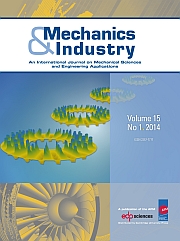Article contents
Cyclostationarity applied to acoustic emission and developmentof a new indicator for monitoring bearing defects
Published online by Cambridge University Press: 16 September 2014
Abstract
The exploitation of cyclostationarity properties of vibratory signals is now more widelyused for monitoring rotating machinery and especially for diagnosing bearing defects. Theacoustic emission (AE) technology has also emerged as a reliable tool for preventivemaintenance of rotating machines. In this study, we propose an experimental study thatcharacterizes the cyclostationary aspect of acoustic emission (AE) signals recorded from adefective bearing (40 μm on the outer race) to see its efficiency to detecta defect at its very early stage of degradation. An industrial sensor (UE10 000) is used.An electrical circuit converts the high frequency signal into an audible signal byheterodyning. The cyclic spectral density, which is a tool dedicated that put intoevidence the presence of cyclostationarity, is used for characterizing thecyclostationary. Two new indicators based on this cyclostationary technique are proposedand compared for early detection of defective bearings.
- Type
- Research Article
- Information
- Copyright
- © AFM, EDP Sciences 2014
References
- 4
- Cited by


